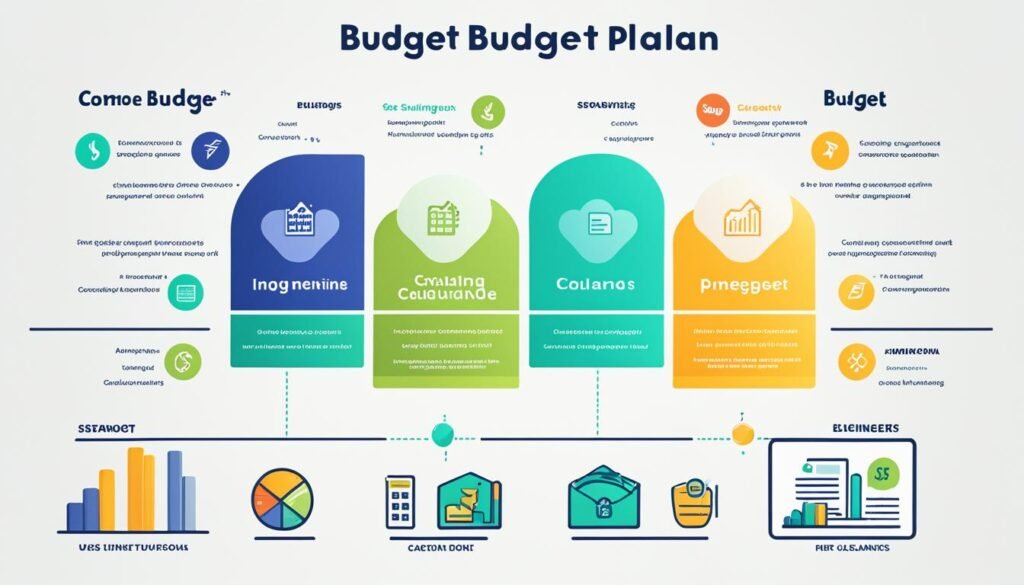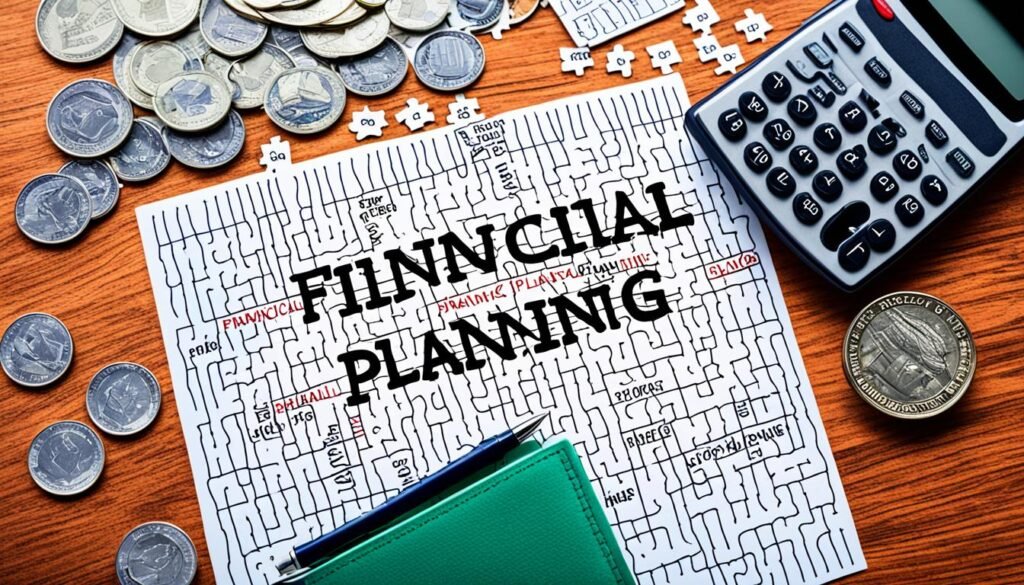Did you know that Investopedia has over *36,000 articles, terms, FAQs,* and videos? It shows how big the finance world is. But, surprisingly, 6% of U.S. households don’t have a bank account. This shows a big need for learning about money basics.
This guide will help fill that gap. It will teach you the basics of personal finance. This knowledge is key for making smart money choices.
Being good with money means more than just knowing terms. It’s about making smart choices with your cash. This guide will show you how to manage your money better. It will help you understand things like savings accounts and credit scores.
By learning these basics, you’re taking big steps towards handling your finances well. This will help you secure your financial future.
Key Takeaways
- Understanding financial literacy is essential for making informed decisions.
- More than 36,000 articles are available at Investopedia for financial education.
- 6% of U.S. households lack a bank account, highlighting the need for better financial education.
- Financial literacy empowers you to manage your budget, savings, and investments effectively.
- This guide will introduce you to fundamental personal finance concepts.
The Importance of Financial Literacy
Financial literacy is key in today’s complex money world. It means understanding and using financial skills well. These skills help you make smart choices about money, like budgeting, saving, and investing.
What is Financial Literacy?
Financial literacy is about knowing important financial ideas and managing money well. It’s about making a budget, saving for emergencies, and understanding credit scores. This knowledge helps you make good financial decisions.
Why It Matters for Beginners
For beginners, financial literacy is a must for managing money well. Not knowing about finances can lead to big mistakes, like too much credit card debt or not saving for retirement. Sadly, 28% of Americans have no retirement savings. Without basic financial knowledge, it’s hard to build a strong financial future.
How Financial Literacy Impacts Daily Life
Your everyday money choices show how well you understand finances. Knowing about budgeting helps you spend wisely. Saving and investing can secure your future and open new opportunities. Understanding credit scores helps you handle debt better. Financial literacy brings more financial stability, less stress, and a better life.

Getting Started with Personal Finance
Starting with personal finance means learning about income, expenses, and savings. These are key for anyone wanting to get better with money. Using personal finance tips early can really help you manage your money better. After getting the basics right, it’s time to set financial goals.
Understanding the Basics
Personal finance covers things like budgeting for beginners, saving for emergencies, and smart investing. It’s important to understand these basics to have a strong financial foundation. Spend time tracking your money in and out to make better choices and avoid debt.
Setting Financial Goals
Setting clear financial goals is key. They can be short-term, like saving for a trip, or long-term, like planning for retirement. Try to save at least 15% of your income for retirement to secure your future. Personal finance tips can help you stay focused and prioritize your goals.
Creating a Financial Vision Board
A financial vision board can be a powerful visual tool. It keeps your goals in sight. By visualizing your financial dreams, you stay motivated to reach them. Include your savings goals, investment plans, or insurance wishes on it. This method motivates you and helps you stick to your financial plans by making them real and tangible.

Finance for Beginners: Budgeting Essentials
Starting your finance journey means learning about budgeting. A budget helps you plan your income and spending over time. It’s key to managing your money well and spotting where you can save.
What is a Budget?
A budget outlines your income and spending. It includes things like your paycheck, bonuses, and investments. It separates your spending into fixed and variable costs.
Fixed costs are things like rent and car loans. Variable costs are for things like food and fun. Knowing these categories is important for beginners.
Steps to Create a Simple Budget
To make a budget, list your income and track your spending. You can use different budgeting methods like traditional or zero-based budgeting. Apps like Mint can make tracking easier.
Set financial goals, like saving for a trip or paying off debt. Make sure your budget fits these goals.
Tracking Your Income and Expenses
Keeping track of your money is key to budgeting. Update your budget often to keep it relevant to your life. This helps you see where you spend too much.
Save a part of your income for savings or paying off debt. This shows you’re serious about managing your money well.

Money Management Tips for Beginners
Managing your money well can really help your financial health. Using key strategies can cut down on spending and boost your financial growth. Here are some top tips to help you manage your money better.
Tips for Reducing Monthly Expenses
Start by making a budget that shows your after-tax income. Sort your expenses into needs, wants, savings/debt, and others to understand where your money goes. Try eating out less and buying things on sale to save money.
Match your spending with what you value most for better financial planning. Check and tweak your budget often to keep up with your financial goals.
Finding Financial Accountability Partners
Be around people who want to achieve the same financial goals as you. Having financial buddies can make your journey more fun and supportive. Talk about your money plans and habits with them to improve your financial habits together.
It’s good to have someone to talk to about your finances. Starting to save or invest early can lead to big financial gains later on.

Saving Strategies for Beginners
Learning how to save is key for anyone wanting to manage their money better. It’s important to understand savings accounts, start an emergency fund, and set goals. These steps can change how you handle money and boost your savings.
Understanding Savings Accounts
Savings accounts are vital for keeping your money safe and earning a bit of interest. They’re a secure spot for your cash, away from your everyday spending. By choosing high-interest savings accounts, you help your money grow. Setting up automatic transfers from your paycheck to savings makes saving easier and helps you follow through with your plans.
Creating an Emergency Fund
Building an emergency fund is a crucial part of a solid financial plan. Start by saving $1,000, then aim for three to six months’ expenses. This fund keeps you from using credit cards or loans for unexpected bills. Make saving for emergencies a key part of your financial strategy.
Setting Saving Goals
Having clear saving goals gives you motivation and a clear path. Whether it’s for a vacation or a new car, try the 100 Envelope Challenge for steady savings. Set aside parts of your income for these goals, making them realistic and exciting. Regularly checking on your goals keeps you on track and committed to financial success.

Investing for Beginners
Starting to invest early can greatly improve your financial future. The sooner you start, the more you gain from compound interest. Many people miss out on big gains by waiting too long to invest.
Importance of Starting Early
It’s key to start investing early for a strong financial base. Putting 15% of your income into investments each year can speed up your retirement savings. By investing early, you use time and compound interest to build wealth over the years.
Beginner Investing Strategies
For new investors, simple strategies can make investing easier. Dollar-cost averaging (DCA) is a good choice, where you invest small amounts regularly. This way, you benefit from different market prices. Lump-sum investing can give higher returns, but DCA helps smooth out market ups and downs.
Knowing your risk level is also important. Questionnaires can help figure out if you’re into short-term trading or long-term growth.
Types of Investments to Consider
Looking into investing? Stocks, bonds, and mutual funds each have their own risks and rewards. High-yield savings accounts and CDs are good for safe investments. ETFs offer flexibility and can be traded all day with no minimum investment.
Many online brokers now have low or no account fees. They even let you invest in fractions of a share, making it easier to start.

Understanding Credit Scores
A credit score is key in your financial journey. It shows how likely you are to pay back money, with scores from 300 to 850. Knowing what affects your score is important. It helps you get loans, get good interest rates, and make big financial choices.
What is a Credit Score?
Your credit score shows how well you handle credit. Payment history counts for 35% of your score. Other factors like how much you owe, your credit history length, new credit, and credit mix also play a part. Scores above 670 are considered good, and scores between 800 and 850 are excellent. Knowing these scores is crucial for finance beginners.
How to Check Your Credit Score
You can check your credit score online for free on many sites. The big three credit agencies give you free credit reports every year. Checking your score often is a smart move to spot any problems early.
Tips to Improve Your Credit Score
Improving your score takes work. Always pay your bills on time, as this is key. Lowering your debts, especially your credit use ratio, also helps. Try to use less than 30% of your credit limit. And, be careful with new credit applications, as too many can hurt your score. Tools like Experian Boost® can even add good info to your report. Following these tips will help you better understand and improve your credit score.

Financial Planning 101
Creating a personal financial plan is key for reaching your financial goals. It helps you set your goals and the steps to get there. This makes handling personal finance easier. It also means checking your progress and changing your plans when needed.
Creating a Personal Financial Plan
Begin by looking at your current finances through budgeting and understanding personal finance basics. Write down your income, expenses, and debts. Then, set your financial goals for now and the future.
Short-term goals might be saving for a trip or an emergency fund. Long-term goals could be saving for retirement, aiming for at least 15% of your income. This way, you manage your money better and secure your financial future.
Setting Short-term vs. Long-term Financial Plans
It’s important to balance short-term and long-term financial plans. Short-term plans help with saving for emergencies, starting with a $1,000 buffer. Long-term plans include saving for retirement, with limits of $23,000 for employer plans and $7,000 for IRAs in 2024.
Keep checking and adjusting your plans as things change. This ensures your financial strategies stay on track with your life.

Conclusion
Learning the basics of finance is key to reaching your financial goals. This guide has given you tips on budgeting and credit scores. It prepares you for what’s ahead. By getting financially literate, you can make smart choices for a secure future.
When looking at investments, think about the long term, even in tough economic times. Stick to your plan and create a portfolio that fits your needs and goals. Understanding compound interest and using tools like Vanguard Index Funds can make you a better investor.
Keep learning about personal finance to get better at managing your money. Reading trusted investment guides or planning for unexpected costs will help you succeed. Stay active and dedicated to your financial path, and you’ll see endless opportunities.



